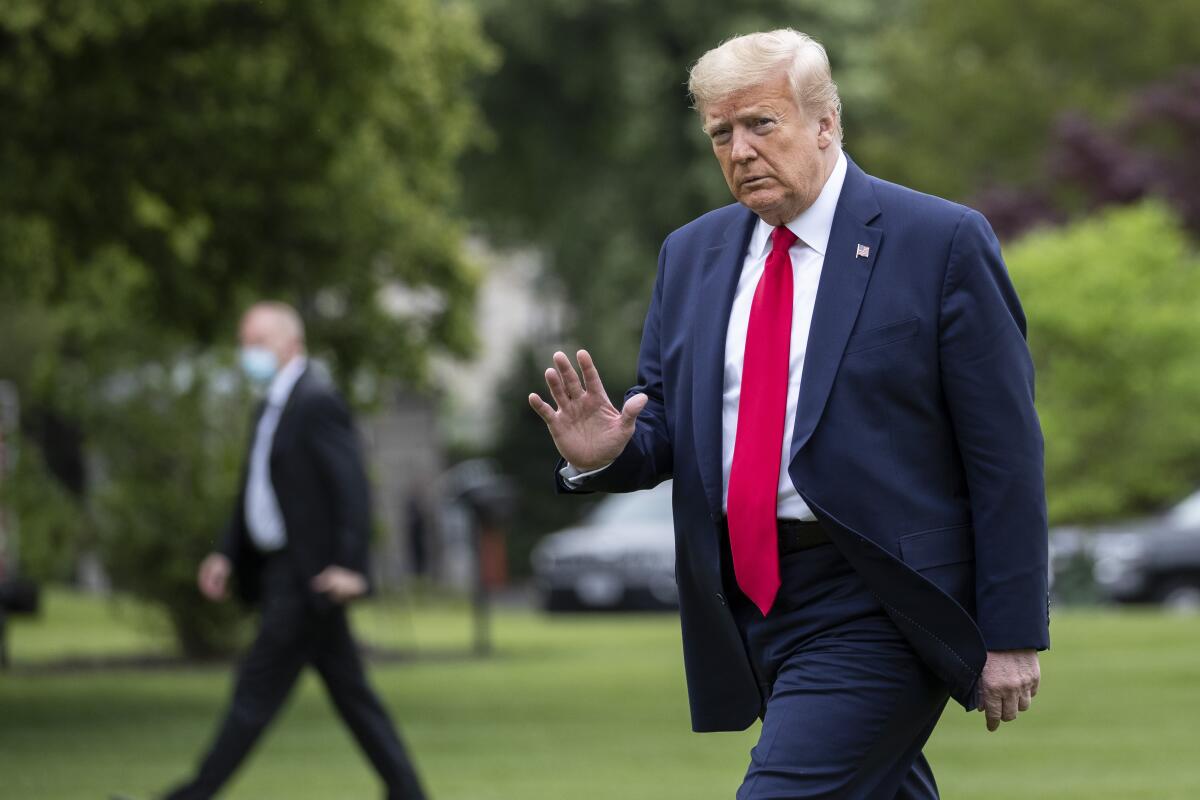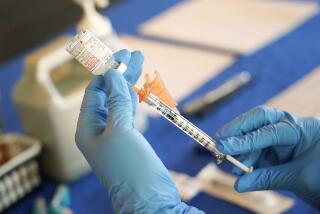Coronavirus vaccine within a year is ‘far from a sure thing,’ expert warns

- Share via
WASHINGTON — A coronavirus vaccine by year’s end is possible, but not something to “bank on,” a leading public health expert warned Sunday as the Trump administration continued to push for swift business reopenings in a bid to revive the battered U.S. economy.
Aides to President Trump have touted vaccine prospects, but they’ve also tried to de-couple significant progress toward an immunization protocol from the need to return to workplaces, schools and public life, as many states are now moving to do.
“Everything does not depend on a vaccine,” Health and Human Services Secretary Alex Azar said on CNN’s “State of the Union,” echoing language used two days earlier by Trump when he announced an ambitious public-private initiative to achieve widespread inoculation by January.
“Vaccine or no vaccine, we’re back,” Trump said Friday.
With the U.S. death toll approaching 90,000, public health experts described the president’s vaccine timetable as ambitious — perhaps overly so.
“Everything would have to break in the right way, and there are many ways that it might not work,” said Tom Inglesby, director of the Center for Health Security at Johns Hopkins University, interviewed on NBC’s “Meet the Press.”
“So I don’t think we should bank on it,” he said, calling a vaccine this year “far from a sure thing.”
Similar caution was voiced by Tom Frieden, a former head of the Centers for Disease Control and Prevention. Interviewed on “Fox News Sunday,” he said a vaccine was “the single most important weapon we could develop against this virus,” but “we don’t have one yet.”
“We hope we will,” Frieden said. “We hope it will be soon, but we cannot count on it.”
Even if a vaccine is developed, logistical challenges to mass inoculation would be daunting, said former Food and Drug Administration head Scott Gottlieb.
“A lot of things can go wrong,” Gottlieb said on CBS’ “Face the Nation.“ “A lot of things can be delayed. It’s very hard to get to the point where you’re manufacturing at high, high quantities.”
The U.S. has the world’s highest known tally of coronavirus infections, with more than 1.5 million confirmed cases. But Azar said an overall plateau in cases and deaths was ample grounds for moving ahead with restarting the economy.
“We are in a position to be able to reopen now,” Azar said on CNN. He also played down any alarm over televised images of packed bars and restaurants in states that have eased shutdowns, casting those who fail to follow physical-distancing guidelines as a minority.
“In any individual instance, you’re going to see people doing things that are irresponsible,” he said. “That’s part of the freedom that we have here in America.”
Other Trump allies used similarly benign language to describe crowding in public places and newly reopened establishments.
“Well, I certainly see a small subset of Wisconsinites celebrating a little freedom,” said Sen. Ron Johnson (R-Wis.), interviewed on CNN. But he said most people were “being very responsible” in terms of mask-wearing and physical distancing.
Azar also said that predicted spikes of infection had not materialized in states such as Georgia and Florida, which moved quickly to reopen, although he acknowledged that it was “still early days.” An upsurge in illness probably would take a couple of weeks to detect since many people don’t develop symptoms right away.
Gov. Mike DeWine of Ohio, a Republican who has sometimes challenged Trump’s push for a speedy end to shutdowns, said he hoped to avoid a resurgence in his state as restrictions are eased.
“We certainly hope we don’t see that,” he said on CNN, noting that “so much is in every individual’s control.”
Experts such as Inglesby said an easing in the growth of the U.S. caseload should be seen as proof that shutdowns worked, rather than a signal that they should not have been imposed in the first place.
“I think lockdowns were necessary,” he said. “They actually have changed the course of the epidemic in the United States.”
He said with the curve moving in the right direction, it was “now appropriate for states to be thinking about how to very carefully reopen, and do it as safely as possible.”
Frieden, the former CDC head, predicted a long and uneven course for outbreaks in individual states, warning that too-rapid lifting of restrictions could bring painful new setbacks.
“We’re likely to see multiple waves in different parts of the country,” he said. “If we go too fast, it will backfire.”
Trump spent the weekend at Camp David, the presidential retreat in Maryland, holding strategy sessions on subjects including the vaccine push.
“We did a lot of terrific meetings,” he told reporters upon returning to the White House on Sunday. “Tremendous progress is being made on many fronts, including coming up with a cure for this horrible plague that has beset our country.”
At the same time, a senior aide unleashed an angry new tirade at Richard Bright, a vaccine expert turned whistleblower who told Congress last week that the administration ignored early warnings about the perils of the virus.
White House trade advisor Peter Navarro, appearing on ABC’s “This Week,” said Bright, who was ousted from his post as the head of a federal medical research agency and refused reassignment to a lesser post, had “deserted” the administration at a moment of “tragedy.”
“We could have used him on the battlefield,” said Navarro, who refused an invitation to testify before the same congressional subcommittee as Bright did.
More to Read
Get the L.A. Times Politics newsletter
Deeply reported insights into legislation, politics and policy from Sacramento, Washington and beyond. In your inbox three times per week.
You may occasionally receive promotional content from the Los Angeles Times.










